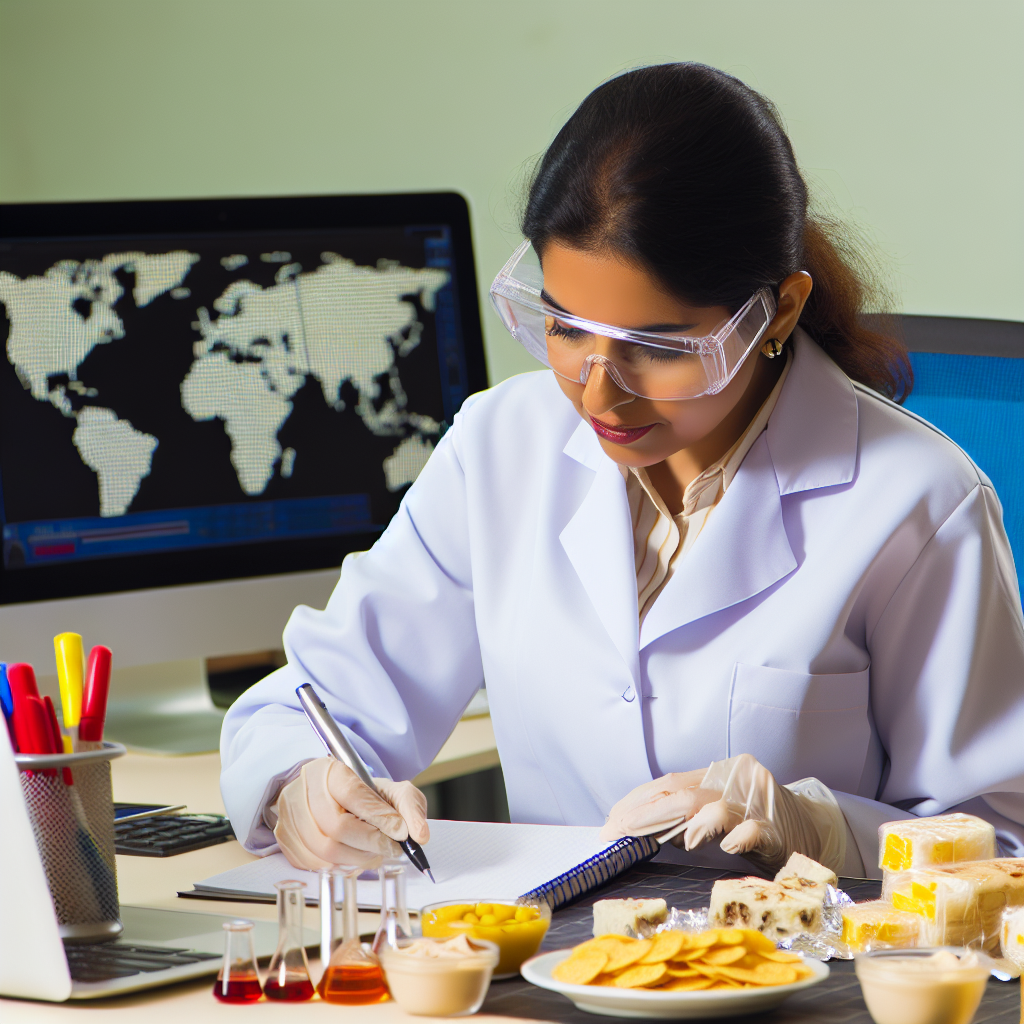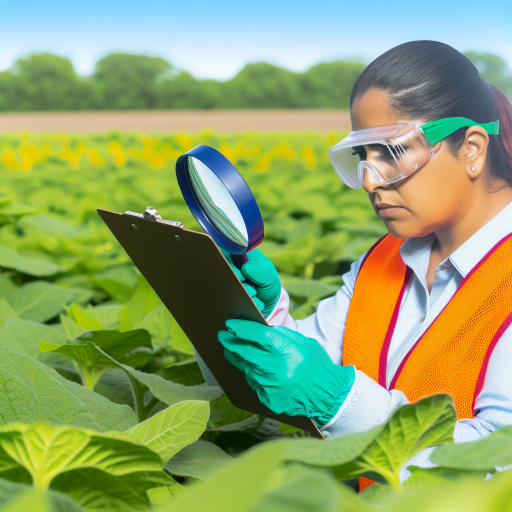Introduction:
Food science is integral to the global food supply chain.
It ensures safety, quality, and accessibility.
Importance of Food Science
Food science involves studying the physical, biological, and chemical makeup of food.
Its aim is to enhance nutritional value.
Role in Food Safety
Food science implements rigorous safety standards.
These standards are crucial to prevent contamination and ensure consumer health.
Ensuring Food Quality
Through food science, the quality of products is monitored.
This monitoring ensures compliance with regulatory standards and consumer expectations.
Promoting Food Accessibility
Food science innovations help in extending shelf life.
These innovations also reduce food waste.
Moreover, they make nutritious food more affordable.
Global Impact
Food science impacts the global food supply chain.
It addresses challenges like food security and sustainability.
Role of Food Scientists in the Global Food Supply Chain
Food scientists play a crucial role in the global food supply chain.
They develop new food products that cater to changing consumer preferences.
Research helps them understand food trends and consumer demands.
They focus on taste, nutrition, and convenience in their products.
Food scientists also improve food safety measures.
One primary responsibility is to ensure that food is safe for consumption.
They implement strict quality control measures to prevent contamination.
Transform Your Career Today
Unlock a personalized career strategy that drives real results. Get tailored advice and a roadmap designed just for you.
Start NowThorough testing and analysis help maintain high food safety standards.
Enhancing food preservation techniques is another key area.
Food scientists explore new ways to extend shelf life without compromising quality.
They develop freezing, drying, canning, and packaging techniques.
This work is essential for reducing food waste.
Food scientists also address food shortages through sustainable practices.
They focus on developing efficient food production methods.
Increasing crop yields and improving soil health are critical goals.
Minimizing waste throughout the supply chain is also a priority.
Food scientists help ensure a steady supply of food globally.
Ensuring food security is paramount in many regions.
Food scientists contribute to access to safe and nutritious food for all.
They research ways to improve resilience in food systems.
Collaborating with policymakers helps develop strategies for food security.
Food scientists play a pivotal role in meeting global food demands.
Through innovation, safety promotion, and sustainability efforts, their expertise is essential.
This ensures a healthy and resilient food system for a growing population.
Advancements in Food Science Technology
Over the years, advancements in food science technology have played a crucial role in revolutionizing the food industry.
These innovations have significantly impacted the way food is produced, packaged, and distributed.
This has led to improved efficiency and quality.
Transform Your Career Today
Unlock a personalized career strategy that drives real results. Get tailored advice and a roadmap designed just for you.
Start NowImproved Production Processes
One of the key areas where food science technology has made a significant impact is in the production processes.
Technologies such as automation, robotics, and artificial intelligence have helped streamline production lines.
This has led to increased productivity and consistency in food manufacturing.
These advancements have also enabled food manufacturers to meet the growing demand for food products more efficiently.
Enhanced Packaging Solutions
Technology has also brought about significant improvements in food packaging.
Innovations such as smart packaging, biodegradable materials, and modified atmosphere packaging have extended the shelf life of food products.
They have also helped reduce food waste.
These advancements have improved food safety by ensuring that products are properly sealed and protected during transportation and storage.
Efficient Distribution Systems
The impact of technology on food distribution cannot be overstated.
With the advent of GPS tracking, RFID technology, and blockchain, companies are now able to track products in real-time.
This ensures that they reach their destination in optimal condition.
This has led to a more efficient supply chain and improved traceability.
Traceability is crucial for ensuring food safety and quality standards are met.
Benefits of Technological Advancements in Food Science
The adoption of technology in the food industry has brought about numerous benefits for both consumers and producers.
These advancements have not only improved the overall efficiency and quality of food production.
They have also paved the way for more sustainable practices and reduced environmental impact.
Improved Food Safety
By utilizing technology such as sensors and monitoring devices, food producers can now closely monitor the quality and safety of their products throughout the production and distribution process.
This has helped reduce the risk of contamination and foodborne illnesses.
Ultimately, it ensures a safer food supply for consumers.
Enhanced Product Quality
Technological advancements have enabled food manufacturers to maintain a higher level of product quality and consistency.
Transform Your Career Today
Unlock a personalized career strategy that drives real results. Get tailored advice and a roadmap designed just for you.
Start NowFrom the use of precision agriculture techniques to advanced processing and packaging methods, these innovations have led to better-tasting, visually appealing, and nutritious food products.
They meet consumer demands for quality and variety.
Sustainability and Waste Reduction
Technology has also played a crucial role in promoting sustainability within the food industry.
By implementing practices such as precision farming, energy-efficient production processes, and eco-friendly packaging materials, companies can reduce their carbon footprint.
They can also minimize waste generation.
This not only benefits the environment but also helps improve the long-term viability of the food supply chain.
The Future of Food Science and Technology
As technology continues to evolve at a rapid pace, the future of the food industry looks promising.
Innovations such as 3D food printing, personalized nutrition, and smart agriculture are on the horizon.
These developments promise to revolutionize the way food is produced, distributed, and consumed.
Personalized Nutrition
Advances in personalized nutrition are set to transform the way we approach food consumption.
Technologies such as wearable devices and personalized meal plans based on individual genetic makeup are expected to become more prevalent.
This will enable consumers to make informed choices about their diets and lifestyles.
Smart Agriculture
The integration of Internet of Things (IoT) technologies in agriculture, also known as smart agriculture, will enable farmers to monitor and manage their crops and livestock more efficiently.
From precision farming to automated irrigation systems, these advancements will improve crop yields.
They will also reduce the environmental impact of agriculture.
3D Food Printing
3D food printing is another exciting innovation that holds great potential for the food industry.
This technology allows for the customization of food products.
It opens up new possibilities for creativity and sustainability.
From personalized chocolates to intricately designed pastries, 3D food printing is set to change the way we think about food production and consumption.
Uncover the Details: How Agricultural Policies Shape Rural Economies
Transform Your Career Today
Unlock a personalized career strategy that drives real results. Get tailored advice and a roadmap designed just for you.
Start NowOne of the major challenges faced by the global food supply chain is food waste.
It is estimated that one-third of all food produced for human consumption is lost or wasted worldwide.
Food waste not only impacts the environment by contributing to greenhouse gas emissions but also puts a strain on resources like water and land that are used to produce food.
In addition, food waste is a social issue as millions of people around the world suffer from hunger and malnutrition.
Food scientists are actively working to address the issue of food waste in the global food supply chain.
They are researching ways to extend the shelf life of perishable foods, developing innovative packaging solutions, and creating technologies to better predict consumer demand.
Another challenge facing the global food supply chain is contamination.
Foodborne illnesses due to contamination pose a significant risk to public health and can result in widespread outbreaks that have serious economic consequences.
Food scientists are working to improve food safety by developing new methods for detecting and preventing contamination in food products.
This includes implementing stricter quality control measures, conducting regular inspections, and investing in advanced technologies for food testing.
Supply chain disruptions are also a major challenge for the global food supply chain.
Natural disasters, political instability, and global pandemics can all disrupt the flow of food from farm to table, leading to shortages and price spikes.
To mitigate supply chain disruptions, food scientists are collaborating with supply chain experts to develop contingency plans.
They are also improving communication between stakeholders and implementing risk management strategies.
In addition, they are exploring alternative distribution channels and storage options to increase the resilience of the food supply chain.
The challenges facing the global food supply chain are complex and multifaceted.
Food scientists play a crucial role in addressing these challenges by innovating new technologies, conducting research, and collaborating with other stakeholders.
Our aim is to ensure a safe, secure, and sustainable food supply for future generations.
By working together, we can overcome these challenges and build a more resilient global food supply chain.
Find Out More: Impact of Pesticides on Environment and Solutions
Transform Your Career Today
Unlock a personalized career strategy that drives real results. Get tailored advice and a roadmap designed just for you.
Start NowFood Science and Sustainability
Food science plays a crucial role in promoting sustainable food production practices.
Here are some key ways in which food scientists are contributing to sustainability.
Developing Eco-Friendly Packaging
One way food scientists are promoting sustainability is by developing eco-friendly packaging solutions.
Traditional packaging materials, such as plastic and Styrofoam, are harmful to the environment.
They take hundreds of years to decompose.
Food scientists are working on creating packaging that is biodegradable and compostable.
This innovation reduces the carbon footprint of food products.
Reducing Food Waste
Food waste is a major issue in the global food supply chain.
Billions of tons of food are wasted each year.
Food scientists are working on methods to reduce food waste.
They develop preservation techniques to extend the shelf life of food products.
Additionally, they explore innovative approaches to repurpose food waste.
This includes turning fruit peels into natural flavorings or food ingredients.
Promoting Ethical Sourcing
Food scientists also contribute to sustainability through promoting ethical sourcing practices.
This involves ensuring food products are sourced from suppliers who follow fair labor practices.
They respect animal welfare and prioritize environmental conservation.
By supporting ethical sourcing, food scientists help to create a sustainable and socially responsible food supply chain.
Food science is at the forefront of promoting sustainability in the global food supply chain.
Through initiatives such as developing eco-friendly packaging, reducing food waste, and promoting ethical sourcing, food scientists are playing a vital role.
They contribute to creating a more sustainable and environmentally friendly food system.
Transform Your Career Today
Unlock a personalized career strategy that drives real results. Get tailored advice and a roadmap designed just for you.
Start NowDiscover More: Agricultural Economists: Tools and Technologies Used

Food Science and Public Health
Food science plays a crucial role in public health by driving innovation in the food industry.
Through research and development, food scientists have been able to create healthier food products that contribute to overall well-being.
Development of Healthier Food Products
One way in which food science impacts public health is through the development of healthier food products.
Food scientists work to improve the nutritional content of foods, reduce the levels of harmful additives, and create new products that promote health and wellness.
For example, advancements in food science have led to the creation of fortified foods that are enriched with essential vitamins and minerals.
These products help combat deficiencies and promote better health outcomes in populations with limited access to fresh fruits and vegetables.
Combating Malnutrition
Food scientists play a key role in combating malnutrition by developing innovative solutions to address food insecurity and nutrient deficiencies.
Through research and experimentation, they work to create sustainable and nutritious food products that can help meet the needs of vulnerable populations.
For instance, food scientists have developed therapeutic foods that are specifically designed to treat severe acute malnutrition in children.
These products are formulated to provide essential nutrients in a concentrated form, helping to restore health and prevent long-term complications.
Preventing Foodborne Illnesses
Another important aspect of food science research is the prevention of foodborne illnesses.
Food scientists work to identify and mitigate potential risks in the food supply chain, ensuring that products are safe for consumption and free from harmful contaminants.
By studying food safety practices and conducting thorough testing, food scientists help prevent outbreaks of foodborne illnesses that can have serious consequences for public health.
Their expertise is crucial in maintaining the integrity of the food supply chain and protecting consumers from harm.
Addressing Other Health Issues
In addition to combating malnutrition and preventing foodborne illnesses, food scientists also work to address a wide range of other health issues.
They conduct research on topics such as food allergies, chronic diseases, and obesity, seeking to find solutions that promote better health outcomes.
For example, food scientists study the impact of dietary factors on the development of chronic conditions like heart disease and diabetes.
By understanding how food choices affect health, they can develop recommendations and guidelines that help individuals make informed decisions about their diet and nutrition.
Explore Further: Preparing for a Career in Agricultural Entomology
Transform Your Career Today
Unlock a personalized career strategy that drives real results. Get tailored advice and a roadmap designed just for you.
Start NowGlobal trends in food science research:
Food science research is constantly evolving to address the changing needs of consumers and the global food supply chain.
Here are some current trends and developments in this field:
Personalized nutrition:
- Personalized nutrition is gaining popularity as people seek customized diet plans based on their genetic makeup, lifestyle, and health goals.
- Advances in technology have made it easier to analyze individual nutrition needs and create tailored recommendations for each person.
- By focusing on personalized nutrition, food scientists are revolutionizing the way we approach diet and health management.
Alternative proteins:
- As the demand for sustainable and plant-based food options grows, food scientists are exploring alternative sources of protein such as pea protein, algae, and insects.
- These alternative proteins offer unique nutritional benefits and have a lower environmental impact compared to traditional animal-based proteins.
- By incorporating alternative proteins into the food supply chain, researchers are working towards a more sustainable and diverse food system.
Functional foods:
- Functional foods are products that provide health benefits beyond basic nutrition, such as improving gut health, boosting immunity, or reducing inflammation.
- Food scientists are developing new functional ingredients and formulations to meet the growing demand for foods that promote health and wellness.
- By focusing on functional foods, researchers are creating innovative products that address specific health concerns and help consumers make better food choices.
These trends in food science research are not only shaping the future of the global food supply chain but also influencing consumer preferences, industry practices, and agricultural sustainability.
By staying at the forefront of these developments, food scientists can play a crucial role in ensuring a safe, nutritious, and sustainable food supply for people around the world.
Implications for the Global Food Supply Chain
Food science plays a crucial role in the global food supply chain by ensuring safety, quality, and innovation.
Continued research and innovation in food science are essential to address challenges in food security and sustainability.
By investing in food science, we can enhance productivity, reduce waste, and create a more resilient food system for the future.
Additional Resources
From Farm to Kitchen: The Environmental Impacts of U.S. Food Waste
Climate Change Impacts on Agriculture and Food Supply | US EPA
[E-Books for Sale]
The Big Book of 500 High-Paying Jobs in America: Unlock Your Earning Potential
$19.99 • 500 High-Paying Jobs • 330 pages
Explore 500 high-paying jobs in America and learn how to boost your career, earn more, and achieve success!
See All 500 High-Paying Jobs of this E-Book
1001 Professions Without a Degree: High-Paying American Jobs You Can Start Now
$19.99 • 1001 Professions Without a Degree • 174 pages
Discover 1001 high-paying jobs without a degree! Unlock career tips, skills, and success strategies for just $19.99!




